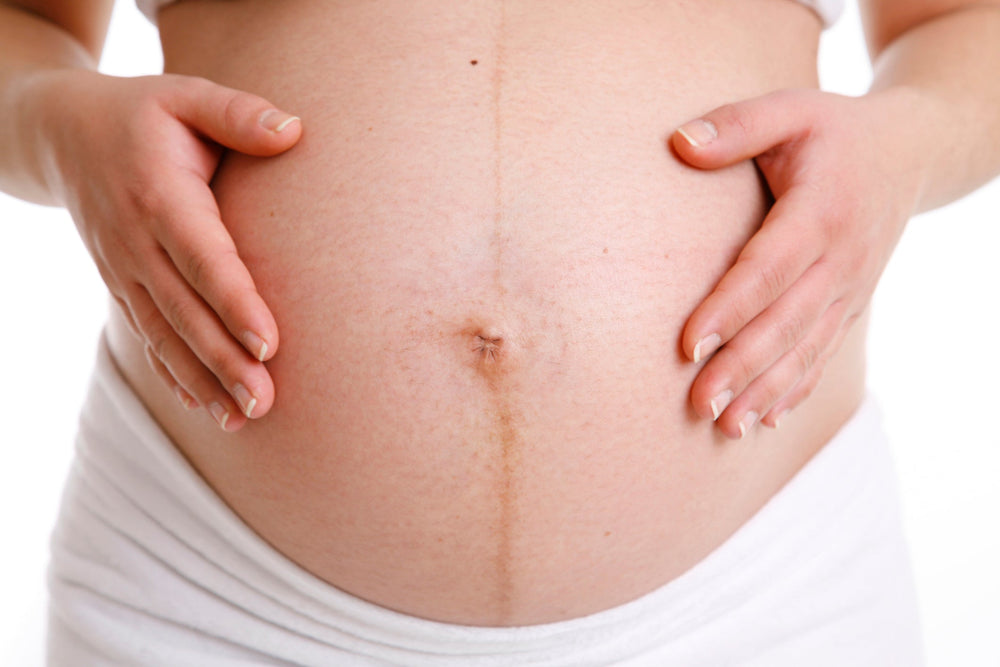Your body goes through many changes whilst your baby grows. You have to adapt pretty quickly to these changes which can affect you both physically and emotionally. When the going gets tough, remember you are growing another human being in there, which although challenges us more than we may have imagined, is also truly amazing. Always be kind to yourself, try to take time out just for you to nurture your body and mind during your pregnancy
Aches and pains
Muscular aches and pains during pregnancy are very common. Not only is your body expanding to accommodate your growing baby, your body produces a hormone called relaxin to help your muscles and ligaments stretch more easily. This combination can cause posture changes as well as stretching, which can mean you experience more aches and pains as your bump grows.
Bump skin changes
You may find that your skin becomes tighter and drier during pregnancy as your bump grows, especially during the second and third trimester. Some women’s skin types cope with the changes better than others. Make sure you use a good moisturiser to help to keep your skin comfortable and in good condition. Well moisturised skin can also help to reduce the feel and appearance of any scars and stretch marks.
As your pregnancy progresses, and often during the second and third trimester, women develop a dark line down the centre of their bump, which can also have more hair growth than usual too. This is called the linea nigra and is a normal part of skin pigment changes during pregnancy. Exposing your bump to sunlight can make this line become darker in colour. The line usually disappears completely a few months after childbirth.
Itchiness
Itching and scratching during pregnancy is much more common than you might think and though can occur throughout, it can be more common in the second and third trimester, as your skin is stretching and changing faster. Try to keep cool by wearing loose fitting, natural fabrics such as cotton, linen or silk. Itchiness can be all over the body, but it is most commonly over your bump and/or legs. Make sure you moisturise your body well to avoid your skin becoming dry and flaky.
If you have itching specifically on the palms of your hands or the soles of your feet, contact your midwife or Maternity Assessment Centre, as there is a pregnancy condition linked to these symptoms, which could require further investigation.
Dizziness
If you feel lightheaded or dizzy whilst you are pregnant, it could be due to hormonal changes or feeling too warm during hot weather. Try not to stay on your feet for too long if possible, take regular rests and make sure your fluid intake is adequate. If these measures do not improve your dizzy spells, contact your midwife or Maternity Assessment Centre for advice.
Swelling
You may experience swelling of various parts of your body during pregnancy. The most common area is the feet and ankles, but the hands, arms, face and other parts of the body can be affected and it is most likely to happen in the third trimester. Find a willing partner or friend to massage your swollen feet and legs whilst reclining, as this can help blood circulation and redistribute the fluid which is causing the problem.
Morning sickness
Nausea can occur at any time during your pregnancy and although it is often called “morning sickness”, it can happen at any time of the day or night. A few women may feel nauseous for their entire pregnancy, but is usually at its worst point during the first trimester. The good news is that it usually disappears around 12-16 weeks of pregnancy. So, don’t feel guilty if you are unable to complete everyday tasks, or if you are too tired to do much exercise, it will most likely be for a short period of time. Remember you are not alone, as 30% of women will need some time off work during their pregnancy due to nausea and vomiting.
Breast changes
Your breast shape will probably change considerably throughout pregnancy as they prepare to produce milk to feed your baby. Having a well-fitting bra (you may change size several times during your pregnancy) will not only support your breasts but will also protect against soreness, chaffing and help you to feel more comfortable.
Tiredness and sleeping
Sleeping during pregnancy can make you warmer than usual and more uncomfortable due to your core body temperature increasing and the extra weight of your pregnancy. Make sure you have plenty of water, a fan and extra pillows for support. Popping a pillow between your knees can often provide support for your hips, bump and back.
Key points to help you adjust during pregnancy
- Stay well hydrated. Your body has increased fluid requirements during pregnancy. If the weather is warmer or you are exercising your fluid needs will increase further, so be prepared and don’t leave home without your refillable water bottle.
- Even if you don’t feel hungry, try to eat small meals regularly rather than having long gaps between meals, as this will prevent your blood glucose levels from dropping and help with any light-headedness or dizzy feelings.
- Your skin is more prone to pigmentation changes that can become patchy over your body, so cover up, use sunscreen and make use of shaded areas when you’re out and about.
- Skin can be itchier during pregnancy causing dry, flaky skin. Build a daily moisturising routine into your day to help to keep skin irritations at bay.
Summary
Your body is making changes to accommodate your growing baby at quite a rapid rate. Knowing what you can expect during the coming months and gathering tips on how to combat these minor ailments can make your pregnancy a more comfortable experience.


















